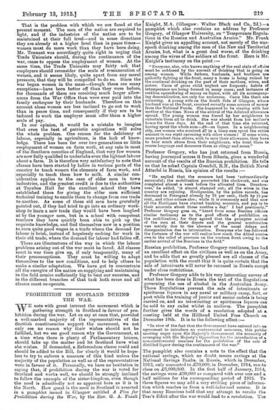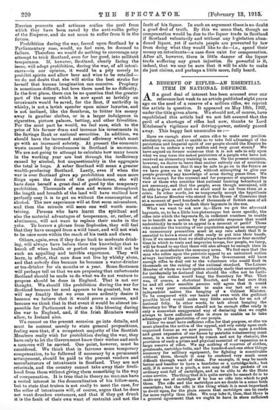PROHIBITION IN SCOTLAND DURING THE WAR.
E note with great interest the movement which is gathering strength in Scotland in favour of pro- hibition during the war. Let us say at once that, provided a well-marked majority of the representatives of the Scottish constituencies support the movement, we not only see no reason why their wishes should not be fulfilled, but we see good reason why the Government, at a time when there is plenty of Parliamentary leisure, should take up the matter and let Scotland have what she wishes. If demanded, a Referendum clause could and should be added to the Bill, for clearly it would be hope- less to try to enforce a measure of this kind unless the majority of the population as well as of the representatives were in favour of it. Personally, we have no hesitation in saying that, if prohibition during the war is voted for Scotland and works well, we should be strongly inclined to follow the example of the sister-kingdom, even though the need is admittedly not so apparent here as it is in the North. How great is the need in Scotland is asserted in a pamphlet issued in Glasgow entitled A Plea for Prohibition during the War, by the Rev. G. A. Frank Knight, M.A. (Glasgow: Walter Black and Co., 2d.)--4 pamphlet which also contains an address by Professor Gregory, of Glasgow University, on "Temperance Regula- tions in the Russian and Australian Armies." Mr. Frank Knight gives an appalling account, not merely of tho war- epoch drinking among the men of the New and Territorial Armies, but, what is a great deal worse, of the drinking among the wives of the soldiers at the front. Here /8 Mr. Knight's testimony on the point:— " Everyone, also, who knows anything of the real state of affairs must be saddened by the amount of drinking that is going on among women. While fathers, husbands, and brothers are gallantly fighting at the front, many a home is being ruined by the continual drinking on the part of their mothers, wives, and sisters. Cases of gross child neglect are frequent; habits of intemperance are being formed in many cases; and instances of reckless squandering of money on liquor, with all its accompany- ing demoralization, are only too numerous. Cases like these are occurring. A young wife on the South Side of Glasgow, wham husband was at the front, received recently some arrears of money from the National Funds. She happened to be staying with her mother at the time. News of the arrival of the deferred allowance spread. The young woman was forced by her neighbours to entertain them all to drink. She was absent from her mother's house for three days. At the end of that time she returned, having spent the whole sum—£8—on liquor. In a neighbouring city, one woman who received £7 in a lump sum spent the entire amount in one night carousing with other women! U some wives, more prudent than others, wish to save their allowance, they have to bear much abuse from their neighbours, who treat them to coarse language and denounce them as stingy and moan."
Professor Gregory, who has just returned from Russia, having journeyed across it from Siberia, gives a wonderful account of the results of the Russian prohibition. He tells no that be asked Captain Grenfoll, RN., the British Naval Attache in Russia, his opinion of the results :-
"He replied that the measure had been 'extraordinarily successful; the mobilization proceeded like clockwork, and was completed almost a week before the allocated time. Drunken- ness,' he added, 'is almost stamped out; all the wives in the country are rejoicing. Hooliganism, by the police records, has decreased in Petrograd already by 75 per cent., theft by 12 per cent., and other crimes also ; while it is commonly said that now all the Hooligans have started banking accounts, and pay in to their accounts about three roubles a day.' I had previously," Professor Gregory goes on, "heard from some Russian officers similar testimony as to the good effects of prohibition on the mobilization; for they agreed that the prompter arrival of the men at their depots and the general acceleration was mainly due to the absence of the usual delays and disorganization due to intoxication. Everyone who has followed the fortunes of the war will realize how much the Allied armies owe to the relief of pressure on the western front owing to the earlier arrival of the Russians in the field."
Russian prohibition, Professor Gregory continues, has had an excellent effect on the civilians as well as on the Army, and he adds that so greatly pleased are all classes of the population with the result that it is quite certain that the sale of intoxicants will never be resumed in Russia except under close restrictions.
Professor Gregory adds to his very interesting survey of what has been done in Russia the text of the Regulations governing the use of alcohol in the Australian Army. These Regulations prevent the sale of intoxicants or spirituous liquors in any naval or military camp, fort, or post while the training of junior and senior cadets is being
carried on, and no intoxicating or spirituous liquors can be sold to any cadet whilst in uniform. The pamphlet
further gives the words of a resolution adopted at a meeting held at the Hillhead United Free Church on December 18th. It is to the following effect :— "In view of the fact that the Government have entered into an agreement to introduce no controversial measures, this public meeting urges upon His Majesty's Government the necessity of arranging with His Majesty's Opposition for the introduction of a non-controversial measure for the prohibition of the Rale of distilled liquor during the continuance of the war."
The pamphlet also contains a note to the effect that the national savings, which no doubt means savings at the National Savings Banks, in Russia, which in December, 1913, only amounted to .270,000, in December, 1914, ran to close on £3,000,000. In the first half of January, 1914, the savings were £30,000 as compared with over one and a half millions for the corresponding period of 1915. To these figures we may add a very striking piece of informa- tion which reaches us from a well-informed source. It is that many Russians hold that any attempt to revoke the Tsar's Edict after the war would lead to a revolution. The
Russian peasants and artisans realize the peril from which they have been saved by the anti-vodka policy of the Emperor, and do not mean to stiffer from it in the future.
Prohibition during the war, forced upon Scotland by a Parliamentary ruse, would, we feel sure, be doomed to failure. Therefore we would do nothing to encourage any attempt to trick Scotland, even for tier good, into militant temperance. If, however, Scotland, clearly facing the issue, will adopt prohibition, during the war, of all intoxi- cants—in our opinion, it would be a pity merely to prohibit spirits and allow beer and wine to be retailed— we do not doubt that she will strike the best stroke for herself that human imagination can conceive. Prophecy is sometimes difficult, but here there need be no difficulty. In the first place, there can be no question that the greater part of the money which is now spent so lavishly on intoxicants would he saved, for the Scot, if nnthrifty in whisky, is not a lavish spender upon minor luxuries, and is not inclined, like the Sonthron, to fritter his money away in gaudier clothes, or in a larger indulgence in cigarettes, picture palaces. betting, and other frivolities. For the most part he would, we feel sure, stick to the price of his former dram and increase his investments in the Savings Bank or national securities. In addition, we should have the increased national efficiency which must go with an increased sobriety. At present the economic waste caused by drunkenness in Scotland is enormous. We are not going to attempt to calculate how many hours in the working year are lost through the inefficiency caused by alcohol, but unquestionably in the aggregate the total is huge. A sober Scotland will mean a greater wealth-producing Scotland. Lastly, even if when the war is over Scotland gives tip prohibition and once more flings open the doors of the publie-house, she will have done herself a great deal of good by the temporary prohibition. Thousands of men and women throughout the length and breadth of the land will have realized how perfectly easy it is to get on without the consumption of alcohol. The new experience will at first seem miraculous, and then the miracle will seem one well worth main- taining. Perseus who have learnt the spiritual and also the material advantages of temperance, or, rather, of abstinence, will not want to replace their necks in the yoke. To borrow a phrase from Sophocles, they will feel that they have escaped from a wild beast, and will not wish to be once more within the reach of his teeth and claws. Others, again, even if they do go back to moderate drink- ing, will always have before them the knowledge that to knock off when health or pocket requires it will nut be such an appalling and terrible experience. They will learn, in effect, that man does not live by whisky alone, and that nobody dies because ho becomes a water-drinker or tea-drinker for six months or a year. Some Scotsmen will perhaps tell us that we are proposing that unfortunate Scotland should be made to do what we do not venture to propose should be done in England. That is not our thought. We should like prohibition during the war for Scotland because her need appears to be greatest, but we will Bay frankly that we even more ardently desire it because we believe that it would prove a success, and because we think that in that event it would bo almost im- possible for Parliament to refuse a like blessing during the war to England, and, if the Irish Members would allow, to Ireland also.
We cannot on the present occasion go into details, and must be content merely to state general propositions, feeling sure that, if a competent majority of the Scottish Members really wish for prohibition during the war, they have only to let the Government know their wishes and such a measure will be carried. One point, however, must be considered. We think that in fairness some temporary compensation, to be followed if necessary by a permanent arrangement, should be paid to the present vendors and manufacturers of intoxicants in Scotland. They are not criminals, and the count7 cannot take away their liveli- hood from them without giving them something in the way of compensation. It is true that in theory no man can have a vested interest in the demoralization of his fellow-men, but to state that truism is not really to meet the case, for the seller of intoxicants will, of course, argue that ho does not want drunken customers, and that if they got drunk it is the fault of their own want of restraint and not the
fault of his liquor. In such an argument therein no doubt a good deal of truth. By this we mean that, though no compensation would be due to the liquor trade in Scotland if Scotland voluntarily and without any legislation aban- doned liquor, yet if certain people are prevented by law from doing what they would like to do—i.e., spend their money on intoxicants—a case does exist for compensation. After all, however, there is little danger of the liquor trade suffering any great injustice. So powerful is it, • indeed, that we may be sure that it will be able to make its just claims, and perhaps a little more, fully heard.







































 Previous page
Previous page